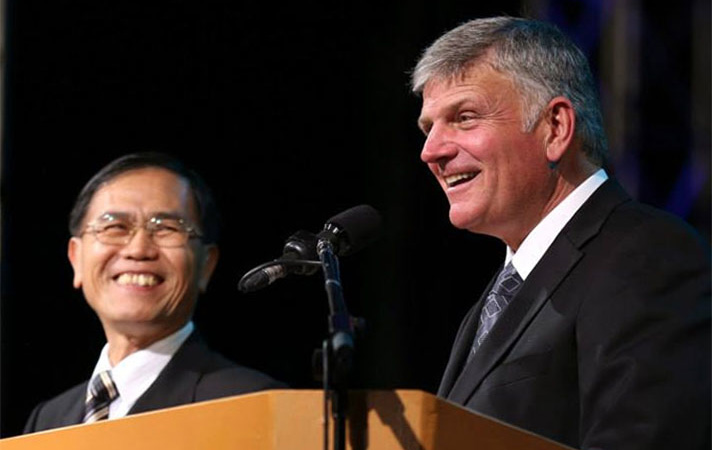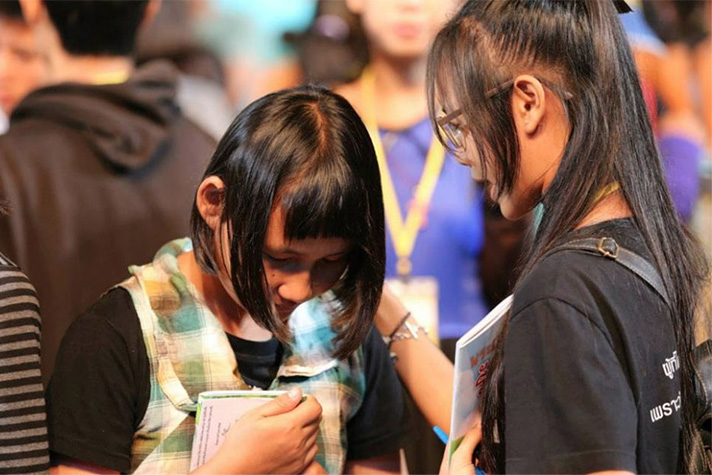
The stadium is packed. A clear, authoritative voice echoes over the metal bleachers. Some 30,000 sets of eyes are fixed on the stage, and there’s an inexplicable sense that something significant is about to happen.
The next words are powerful but gentle, and the invitation is simple.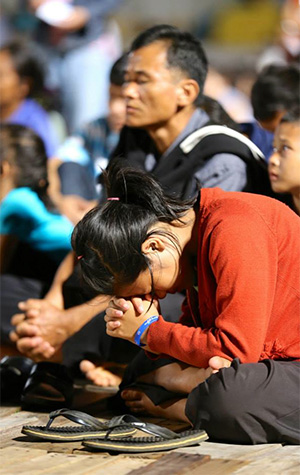
“Just get up and come right now.”
Slowly, feet begin to shuffle across the bleachers, making their way down the steps to the infield below.
“You know you need Christ. You know you need forgiveness. You know you need His peace and His joy, and you’d like to leave here a new person.”
Now the infield is packed. Men, women and children are responding to an invitation to accept Jesus Christ into their lives. Soon, a sea of of heads is bowed in prayer as the speaker—once Billy Graham, now Franklin Graham, Will Graham or another associate evangelist—guides the new believers through the first steps in their new walk with God.
It’s a joyous end to a night of music, dance and preaching.
It’s also the culmination of months—sometimes years—of prayer and preparation, and it’s just the beginning of a strategic follow-up process that continues long after the last stadium lights flicker into darkness.
The Invitation
In 2014, the Billy Graham Evangelistic Association (BGEA) plans to hold Crusades in 26 cities, from El Paso, Texas to Sapporo, Japan, including seven Franklin Graham Festivals and five Will Graham Celebrations. But before ministry leaders consider sending an evangelist to a particular place, they must receive an invitation from the host city.
“We go to the places where we’re invited and where the invitation is strong,” said Viktor Hamm, vice president of Crusade ministries at BGEA. “It’s one thing to have a signature on a paper. It’s another thing to commit the Church to the work that needs to be done.”
The invites come in all shapes and sizes, from official letters from government leaders to handwritten notes from elderly ladies who are praying for revival in their city.
BGEA leaders are praying, too, asking God to lead them in every decision.
“Sometimes I’m asked to list the most important steps in preparing for an evangelistic mission,” Billy Graham once said, “and my reply is always the same: Prayer, prayer, prayer.”
“Prayer undergirds everything,” Hamm said. “If there is no prayer, nothing works.”
Yet the BGEA doesn’t have a formula for the one factor that forms the foundation of the Crusade ministry.
“You cannot organize prayer,” Hamm said. “You can hold prayer vigils, you can have prayer meetings, you can have days of prayer and fasting, print prayer cards, but you cannot organize prayer. Prayer needs to come out of a broken heart. Then it’s true prayer.
“Every evangelistic effort usually starts within a broken heart of one person.”
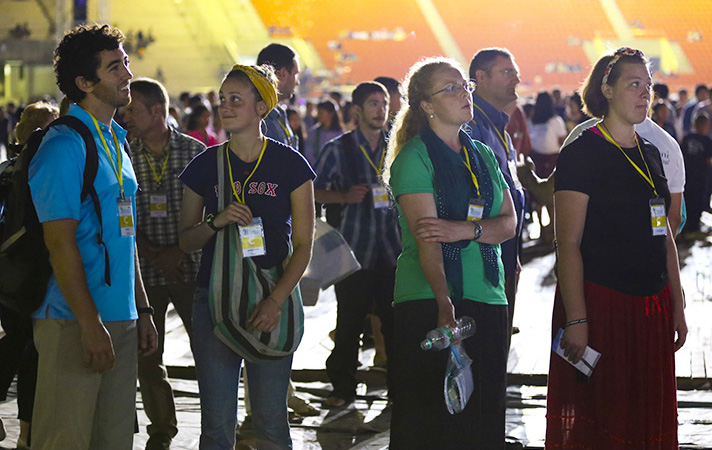
Preparation
The Festival of Abundant Life with Franklin Graham took place in Chiang Mai, Thailand in November, 2013. Planning for the three-night event began 12 months earlier.
When the BGEA accepts a Crusade invitation, a small office is opened in the host city, and a temporary local staff is hired to assist with event planning, venue preparation, advertising and much more.
But the most important job is mobilizing the churches.
Hundreds—sometimes thousands—of volunteers must be trained in sharing their faith, explaining the Gospel and helping new Christians in their relationship with Jesus.
Months before each Crusade (known as a Festival when Franklin Graham is preaching or a Celebration when his son, Will Graham, is the evangelist), the local volunteers are trained through the BGEA’s Christian Life and Witness Course.
During that time, fundraising efforts are also underway.
Typically, the cost of a Crusade is shared between the BGEA and the local Church. In developed countries, fundraising is fairly straightforward. In underdeveloped countries, on the other hand, the task of raising support requires some creativity.
“In some poor countries, they raise chicken and sell the eggs just to make a contribution,” Hamm said. “In any city, whether they’re rich or poor, the opportunity is always presented to the local city to contribute to their city.”
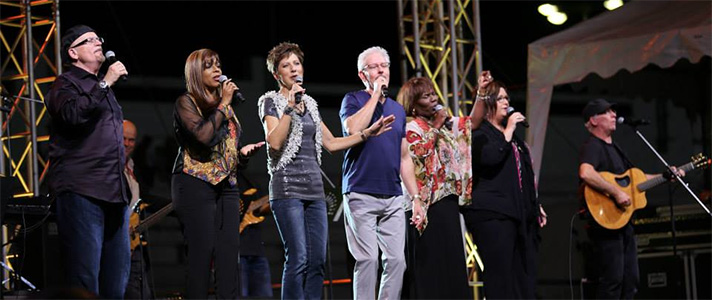
The Event
When the counselors are trained and the stage is set, it’s time for the visible part of the Crusade to begin—the part Viktor would call “the tip of the iceberg.”
Producers, videographers, sound techs, lighting experts, translators, security guards, local police and hundreds of volunteers make last-minute preparations behind the scenes as people arrive from across the region and beyond.
Music and dance performances begin, featuring popular artists from the host region, as well as worship music from American groups like the Tommy Coomes Band and Dennis Agajanian.
Finally, the Gospel message is presented, from the problem of sin to its only solution—Jesus, the Son of God.
On the last night of the Chiang Mai Festival, Franklin Graham shared the Gospel with more than 30,000 people in attendance.
“Tonight, you can come home to your Father in heaven, if you’re willing to put your faith and trust in Jesus Christ,” Franklin Graham said. “God will forgive your sins tonight. You can have a new beginning and a new life. God loves you.”
That night, more than 1,000 people responded to the invitation to accept Christ. It was a sight Viktor Hamm has seen hundreds of times, but it never gets old.
“You could never get tired of seeing streams of people coming,” he said. “Some in desperation, some in joy. The Gospel has a built-in power. Speak it. It’ll do the job. You can’t explain it.”
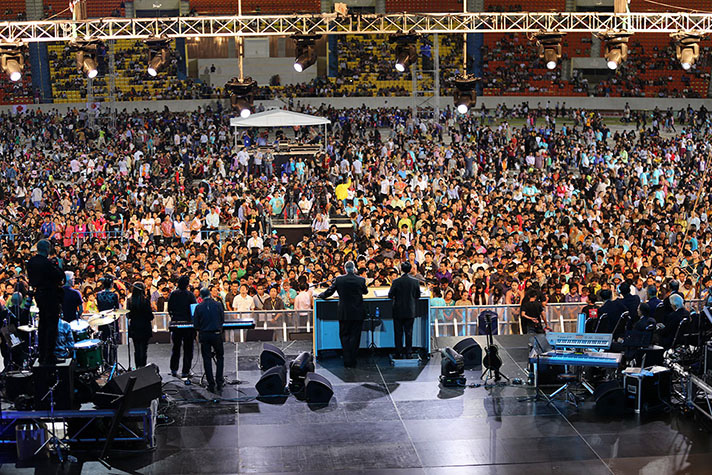
Follow Up
Before the last person leaves the stadium, the follow up work has already begun.
BGEA staff work with local volunteers to collect names and contact information for all the people who came forward minutes earlier. The new believers already have materials to help them grow in their walk with God. The next step is getting them plugged into a Bible-believing local church.
“All the people who have responded get a phone call,” Hamm said. “And the question is, ‘Has anyone contacted you after the Festival? We just want to make sure you’re connected to a church.’”
The local BGEA office typically stays open for several months after the Crusade, paying bills, conducting an audit and following up with churches.
“We take it very seriously,” Hamm said. “It’s not just coming in, doing your show and moving on.”
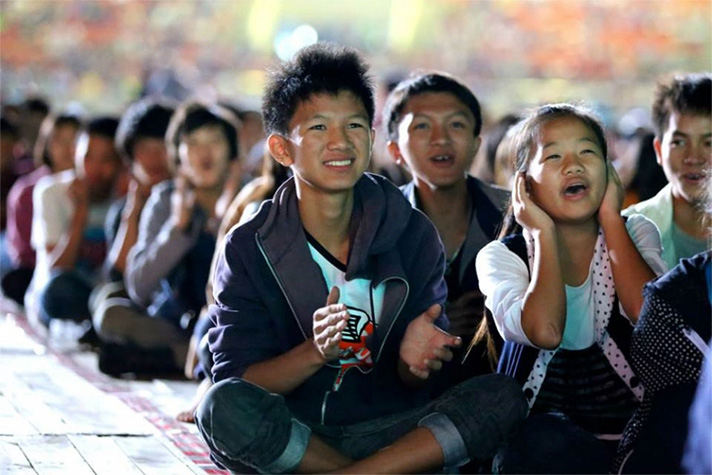
Leaving a Legacy
Over the course of more than 60 years of ministry in nearly 200 countries, the BGEA has noticed a trend. After each Crusade, the local Church is stronger than before.
In Chiang Mai, the unity forged among the churches was seen as miraculous. Two denominations that previously avoided one another joined together to reach out to their fellow Thai.
“All our denominational backgrounds melted, and we became one,” said Thai pastor Kiat Luksanasakulchai.
“The Crusade always results in bringing the churches closer together,” Hamm said. “We have heard the leaders say after almost every Crusade, that even if we wouldn’t have had the services in the stadium, what was invested and done beforehand was worth it. And that’s the legacy of BGEA investing into the lives of the churches.”
A successful Crusade strengthens not just the churches but the entire community. Changes in a city or region are difficult to quantify, and true transformation takes years. But the stories that arrive at the BGEA each day offer evidence of lasting change.
“My grandparents, Grady and Cera McAfee came to know Christ in the [1956] Oklahoma City Crusade,” Kevin McAfee commented on the BGEA website on Dec. 11, 2013. “My father came to know Christ as a result, and I followed suit as a young man.”
“We now attend a very large church in Des Moines, Iowa,” Mary Skaggs wrote the same day. “Recently our pastor asked for a raise of hands of how many accepted Jesus into their heart through Billy Graham’s ministry. Over half the congregation raised their hands…a real tribute to not only the power of Billy’s message but the massive extent of lives touched over the years!”
In a recent post to the BGEA Facebook page, Phillip Jelks from Colorado simply wrote, “Thanks for introducing me to Jesus Christ.”
Of the countless souls that have collided with God’s love through a BGEA Crusade, few may ever realize how much prayer, preparation and follow up work goes into each experience. And that’s OK. At their heart, Crusades aren’t about an evangelist or an event. They’re about glorifying God.
Now to him who is able to do far more abundantly than all that we ask or think, according to the power at work within us, to him be glory in the church and in Christ Jesus throughout all generations, forever and ever. Amen. –Ephesians 3:20-21 (ESV)
